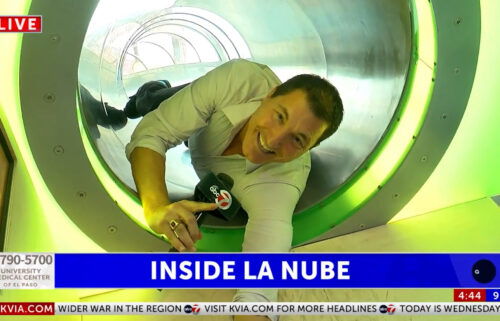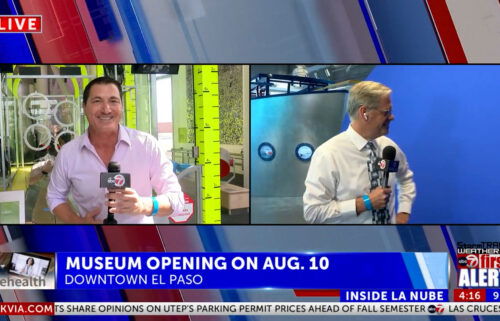Alligator Hunting: For two Florida friends, a last chance to kill an elusive beast
Click here for updates on this story
Crescent Lake CRESCENT LAKE—There ain’t nothing to be afraid of when hunting a 14-foot alligator.
Richie Smith has been doing it long before it was even legal in Florida. He knows by now, the gator he’s been chasing for years isn’t interested in turning him into breakfast or lunch or dinner. It just wants to get away.
Smith and his buddy Alex Horton have never seen the massive reptile in its entirety but by the glimpses they’ve had, they know it’s a big one. Well over 13 feet, the beast has the potential to break the state record, set at 14 feet and 3.5 inches for length and 1,043 pounds for weight.
But every hunt turns into the same battle: a hook in its back, a white-knuckled grip on the rod, a snapped line. And the gator is gone; Moby Dick. It’s been this way for years. But this hunting season, they believe, would be different. They were not going to let the elusive gator get away. Not this time.
Wait and then wait some more
On the last Saturday of Florida’s alligator hunting season, Smith and Horton get ready for the water. They have been hunting monster alligators on Crescent Lake for six or seven years, maybe more like eight –– they can’t keep track anymore. What they do keep track of is the size of the gators. Nothing under 10 feet; 12 feet or more would be better.
The season runs each year from August 15 to November 1 and is a way to control the population of roughly 1.3 million alligators that make their home in the Sunshine State. Of those, 8,404 alligators fell prey to mankind in last year’s hunt.
The weather is not a friend this evening and through patches of rain, Smith and Horton haul their boat along two-lane back roads from their homes in Keystone Heights to the lake on the border of Putnam and Flagler counties. They are just two of more than 15,000 people who applied for one of 7,679 alligator hunting permits this season. The applications, selected through a random drawing, gives each hunter permission to harvest two alligators.
The early evening skies begin to clear by the time the two hunters hit the water at 5. But the wind is still a problem. The ripples in the water greatly hinder their chances of spotting the beast –– or any gator for that matter. Still they press on. They have 17 hours before they will have to stop; hunting alligators is only permitted from 5 p.m. to 10 a.m. Time is of the essence.
They nestle their boat in one corner of the lake. Smith sits at the front scrolling through photos and cracking jokes. His white scraggly goatee and thin glasses peer out from under his “Trump 2020: No bullshit” hat. He’s loud and eccentric with a deep Southern drawl and no filter to control it. Horton leans against the boat motor with his legs crossed. He takes drags of his Marlboro, flicking the ash into the water. His eyes scan the edges of the lake like a hawk. He’s a hunter, quiet and stoic. He knows every inch of the lake from the years he’s spent catching animals on it.
Anyone who knows anything about alligator hunting in the area knows Horton’s name. But Horton is modest about his reputation, brushing off compliments.
There’s nothing left to do now but wait.
And wait.
They watch a flock of ducks fly above through the orange and
pink sunset hues. Smith makes his fingers into the shape of a gun
and points to the sky
Pow.
“You missed.”
A hook and a struggle
Roughly four weeks earlier, Horton had seen the beast when it came out of the swamp. With the determination of Captain Ahab, Horton stayed on the lake for five days, tucked hidden in the woods, perfectly still and silent.
He knows how these big gators work. This one swam a few hundred yards out, and paced the lake. Horton could see its dinosaur-like leathery scales and bony plates running down its back. He could see its yellow slits for eyes scanning the shore.
If the gator were to so much as hear a whisper from the boat, it was sure to head back into the swamp and not to be seen again for many days. Horton knew this was his only shot. He had been in this position before. He knew the animal would give him a chance like this only once in a year.
Horton threw out a line. One hook bent after another. He battled the giant but the hooks just weren’t strong enough to lodge in the thick scutes on the alligator’s back. Why didn’t he have his harpoon tips with him on this day? Things might have been different then. But, dammit, he tried.
Gators that size can usually stay underwater for hours but after being hooked twice, this gator seemed worn out. It popped its head up after five minutes to catch its breath.
The third hook of the morning was just before the hunting window closed at 10 a.m. Horton planned to have two fishing poles on the gator, then let it wear itself out. The gator struggled with the little energy it had left. The hunter fought back just as hard.
But then? Snap.
The gator swam away, robbing the hunter of his prize.
Horton had lost again.
“He should have been a dead alligator.”
Melons or gators?
Horton had wanted to get back on the water for another try the following week, but life got in the way. Smith was bull-rider turned concrete man. Horton was a construction man turned watermelon farmer.
Agriculture was in Horton’s blood. He was raised a citrus farmer in Fort Pierce and knew he wanted to eventually get back to farming. About eight years ago he decided to make the switch and now farms watermelons all the way from south Florida to Georgia.
This year Horton was trying out an experimental winter harvest, something he’d never done before. The only problem was that it interfered with the alligator hunt. There were only a few weeks remaining to the season.
The two friends made plans to go out early in the morning but the trips would inevitably get canceled; Horton needed the time to harvest his melons. They would set a later date. And be forced to cancel again.
A week passed this way. Then another. Three weeks. Four.
Horton had only harvested 15 of his 60 acres of watermelons, but he realized his last chance at catching his alligator was now. In a few days, the season would be over.
So here they were, back on the lake, with only a few hours between them and their gator.
One last chance to get one
Smith slurps Cajun boiled peanuts and flicks the shells into the water. Horton trolls the boat up the edge of the lake. Smith has already moved on. He’s dreaming of shooting ducks and is eagerly awaiting a cold front that might trigger a duck migration.
“It cannot get cold Richie, I haven’t even picked 30 acres yet,” Horton reminds him.
“You’re too much in the money, Alex,” Smith replies. “You can only make so much.”
About an hour goes by. As it sets, the golden sun flickers between color-changing leaves on trees that canopy the narrow creek branching off the main lake. Evening hunts are hard, the gators are just starting to leave the swamp and move to the middle of the lake, where they feed during the night. Horton and Smith prefer to hunt in the morning when the gators are heading back in.
Horton finally spots one through his binoculars. Smith grabs his own pair and eyes the lake. But by the time they get to the gator, it has already plunged back into the depths of the swamp. The big gators are smart.
Defeated, Smith lays down his pole, wiggles a can of dipping tobacco out from a perfectly worn circle in the back pocket of his denim jeans and loads his bottom lip.
“Well that was one shot,” he says.
Alligator hunting has turned into big business in Florida. Visitors from all over America flock to Florida for guided hunting tours during the season. They bring their catch to processors where they are skinned and harvested for their meat, on their way to becoming a designer handbag in an upscale mall or a basket of gator fingers at a restaurant.
But for Smith it’s about the sportsmanship, and more importantly, making memories. Sure, it would feel great to get the big one and break the state record, but it wouldn’t be worth doing it without one of his buddies.
He cherishes his conversations with Horton, which often evolve away from hunting as the two friends spend endless hours together on a boat.
With a devious smile, Smith asks about a potential job working for Horton.
“Will you be able to listen to me?” Horton asks.
Sure, but he only wants to work Monday through Thursday during hunting season. And he has a long list of questions: How would he get paid? Would there be a chance to invest in the company? Insurance? Retirement?
“Retireme… that’s a good gator right there,” Horton yells without skipping a beat. “Where at?”
Smith hops to his feet and grabs a fishing pole. Horton throws the boat into gear and zooms across the lake. Their hearts are racing as they approach the spot where they sighted the gator. They stop and wait in silence. Minutes tick by. Nothing.
The gator is gone.
The sun begins to sink under the horizon and ominous storm clouds replace the orange sunset. Horton and Smith know they must head back to the dock. There’s no point of hunting in the rain.
On this evening, there will be no final battle against their beast. No adrenaline-filled fight for the animal’s life. Just a few laughs and some bobbing logs that look like gators to the untrained eye. The season is fast coming to an end and the two friends know they must wait another year to hunt again. They also know their gator, their Moby Dick, is still out there somewhere deep in the swamp, waiting for them.
Please note: This content carries a strict local market embargo. If you share the same market as the contributor of this article, you may not use it on any platform.
Gary Greenggreen@wuft.org352-294-1502




